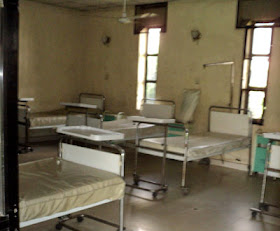It is not uncommon to find that in the midst of several conflicting reports, accusations and counter-accusations, the most salient and important of details are quickly forgotten while "shadow-chasing" very often becomes the order of the day.
Over the last few weeks I have come across several reports in the dailies and on social media as regards the on-going events in the Nigerian health sector. Most of these reports and articles, lopsided on many occasions, have a common denominator, presenting the Nigerian doctor as an enemy of the people and the manner of their submissions is such as to draw undue sympathy from the unsuspecting public and sometimes misinformed public.
It is perhaps apt at such a time as this to look closely at the health sector in Nigeria (which has being recently tagged "one of the least adequate on the continent" by the international media) and the real issues surrounding the nationwide strike action embarked upon by doctors under the umbrella of the Nigerian Medical Association (NMA) which enters it's 5th week from Tuesday the 29th.
I should quickly point out that the deplorable state of our healthcare system is not as a result of the performance of the health workers, but it is a component of an overall failed system called Nigeria which the Government is presently trying to salvage.
It must be recalled that the Nigerian Medical Association did state that it was taking the "painful decision" of indefinite withdrawal of services in order to save the healthcare system from imminent collapse. This was after the body had tabled a 23-point demand to the Federal Government about 2 weeks prior to the commencement of the strike action and issuing a 14-day ultimatum for the resolution of the issues.
Two of the key demands of the Nigerian Medical Association include:
1. Issues relating to the appointment of Chief Medical Directors and other federal appointments in the health sector. Clearly "the position of the Chief Medical Director must continue to be occupied by a medical doctor as contained in the Act establishing tertiary hospitals.
BY THE WAY
There are demands from other “Health Professionals” under the auspices of the Joint Health Workers Union (JOHESU) for the chance to occupy such offices as the Chief Medical Director.
2. An increase in doctors hazard allowance, skipping of grade level 12 (CONMESS 2) for medical and dental practitioners and the reversal of the title of consultants for other professionals in the health care system apart from doctors.
The NMA is largely displeased with certain appointments in the health sector which could distort the chain of command in health institutions and also lead to poor management of patients.
There is no doubt that the average Nigerian doctor is eager to return to work and deliver health care services to an already "short-changed" populace : We presently have less than 30,000 doctors looking after 170 million Nigerians ( a ratio of one doctor to 6000 patients! ). It is however of utmost importance to have a functional working environment, whereby the "over-stretched" Nigerian medical doctor is not hassled by "farcical" policies and defective welfare packages.
Source: Medicall-Inc

No comments:
Post a Comment
Please leave your comments here.